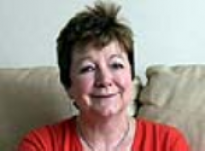Sandra - Interview 1

More about me...
Sandra was diagnosed with DCIS in 2007 after having a routine 3-yearly mammogram. She had had a few mammograms privately before the age of fifty after hearing that a friend’s sister had had breast cancer. Sandra had also had benign cysts in the past. At the age of fifty, she was invited for a routine mammogram on the NHS Breast Screening Programme and was recalled shortly afterwards. She wasn’t worried at that stage because she thought the x-rays might have found more cysts.
Sandra looked for more information on DCIS on the internet. She found cancer forums helpful but sometimes felt that she spent too much time on them. She went back to work ten weeks after surgery but found she was extremely tired when she got home because she had two young children to care for. Around this time, she got a breast implant infection and had to take time off work to recover. At the time of interview, Sandra was feeling physically and emotionally better than she had for a long time and was looking forward to a phased return to work.
Sandra was interviewed for the Healthtalkonline website in 2008.
After her biopsy, Sandra looked for more information on the internet.
After her biopsy, Sandra looked for more information on the internet.
Sandra was glad she could have an immediate reconstruction and felt lucky the DCIS had been picked up early.
Sandra was glad she could have an immediate reconstruction and felt lucky the DCIS had been picked up early.
Sandra is happier with her new breast now and plans to have her healthy breast lifted and nipple reconstruction.
Sandra is happier with her new breast now and plans to have her healthy breast lifted and nipple reconstruction.
Sandra was in no pain at all after coming round. Because she was treated in the hospital in which she worked, she had lots of visitors and didn't always get much rest.
Sandra was in no pain at all after coming round. Because she was treated in the hospital in which she worked, she had lots of visitors and didn't always get much rest.
Sandra was confused about whether she needed radiotherapy. She wanted more information and found it helpful talking to her plastic surgeon.
Sandra was confused about whether she needed radiotherapy. She wanted more information and found it helpful talking to her plastic surgeon.
Sandra's son became more disorganised at school and tearful. She worried that he was finding distressing information on cancer websites.
Sandra's son became more disorganised at school and tearful. She worried that he was finding distressing information on cancer websites.
Sandra feels that it is sometimes harder to be diagnosed with DCIS than invasive breast cancer, especially for women who need a mastectomy.
Sandra feels that it is sometimes harder to be diagnosed with DCIS than invasive breast cancer, especially for women who need a mastectomy.
Sandra asked her breast care nurse for some information about how to talk to her ten and twelve year old boys about her diagnosis. It was surprisingly accurate in predicting how they would react.
Sandra asked her breast care nurse for some information about how to talk to her ten and twelve year old boys about her diagnosis. It was surprisingly accurate in predicting how they would react.
Sandra gave a booklet about talking to children to her next door neighbour. She overheard the two ten year olds casually discussing her surgery while they bounced on a trampoline.
Sandra gave a booklet about talking to children to her next door neighbour. She overheard the two ten year olds casually discussing her surgery while they bounced on a trampoline.
Sandra regretted having joked with her colleagues about going for a mammogram. She found it very upsetting when people tried to comfort her.
Sandra regretted having joked with her colleagues about going for a mammogram. She found it very upsetting when people tried to comfort her.


